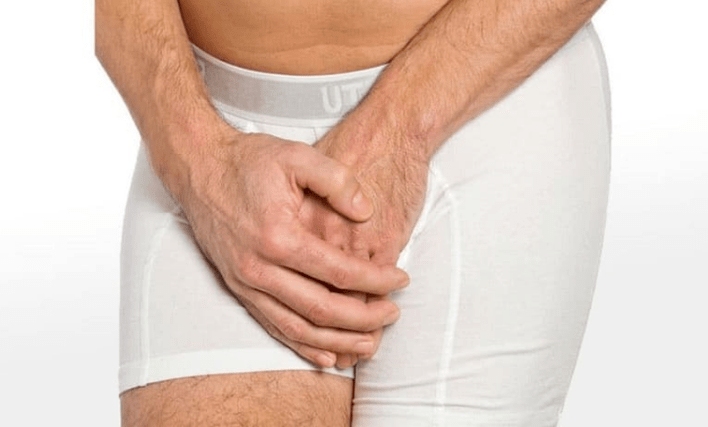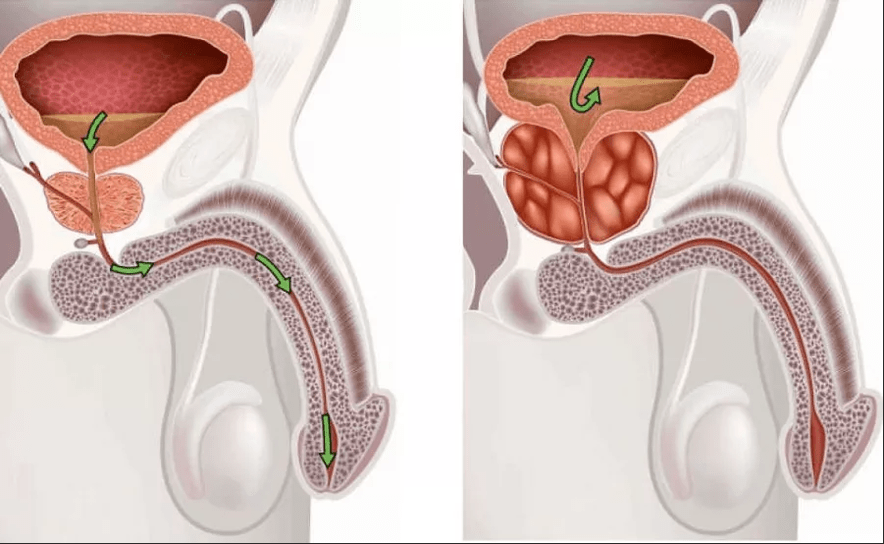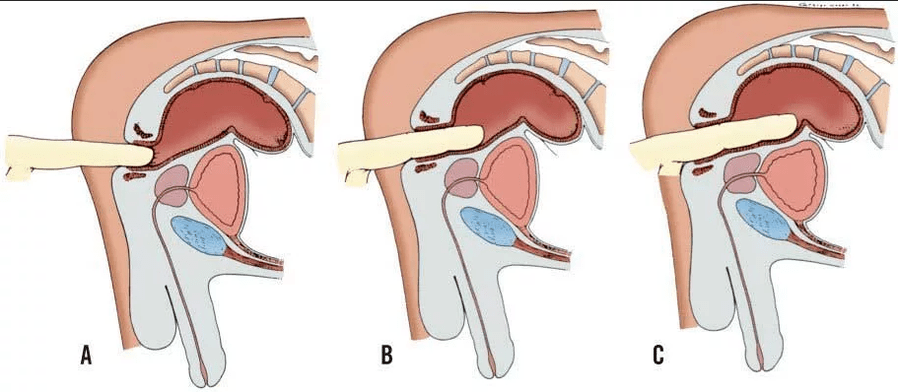Prostatitis is the inflammation of the prostate glands of the person.Prostat is located just below the bladder and the size of chestnuts.It surrounds the first part of the urethra and stretches for such a - corded pelvic floor, which consists of muscles.

Prostat produces excrete, which includes dogs and cum.The dog makes the ejaculate more liquid.Spermine is important for sperm mobility.
Prostatitis is mainly associated with strong pain in the perineum and anal area.In addition, symptoms such as urination frequency, pain during urination and pain during ejaculation appear during prostate inflammation.
Prostat is relatively often affected by inflammation.The probability of prostate infection increases with age.Studies show that most cases aged 40 to 50.
Prostatitis syndrome
At the same time an extended understanding of prostitis terminal appeared.In addition to--reduced prostatitis syndrome, several complaints are concisely in the field of human pelvis, which usually has an unknown reason.The term "prostatitis syndrome" summarizes various clinical images:
- Acute bacterial prostatitis
- Chronic bacterial prostatitis
- Inflammatory and non-coating syndrome of chronic pelvic pain
- Asymptomatic prostatitis
Acute and chronic bacterial prostatitis
Acute prostatitis causes bacteria.Bacteria or pass through the blood on a prostate or spread from bacterial bladder infection or urethra to prostate.Acute prostatitis is usually a serious general condition with strong pain during urination, fever and cold.
Chronic prostatitis can be developed from the acute: If more than three months are the prostate inflammation and repeated microbes in urine, so-the corded prostate express or ejaculate, then it is chronic inflammation.
Bacterial prostatitis.This is less lightning speed than acute prostatitis.Although chronic prostate prostate inflammation causes pain during urination and, perhaps, a feeling of pressure in the perineum, but complaints are usually not expressed as in acute prostatitis.
Chronic criminal syndrome (ababital prostatitis)
In most cases, prostate infections, bacteria cannot be detected in urine, prostate, or ejaculate as the cause of the disease.Prostatitis trigger remains unclear.The doctors call him a chronic pelvis.
However, in such cases, leukocytes can often be detected as an expression of inflammation in the prostate.To distinguish this, another form of disease in which bacteria or leukocytes are not detected.Chronic pain syndrome in the pelvis is the most common form of prostatitis.

Asymptomatic prostatitis
In rare cases, asymptomatic prostatitis occurs.This form prostatitis, although there are signs of inflammation, but there are no pain or other symptoms.Asymptomatic prostatitis is usually revealed by accident, for example, as part of the infertility study.
Prostatitis: Symptoms
The prostate inflammation can cause different prostatitis symptoms.Although symptoms of acute prostatitis can be very serious and cause a strong feeling of discomfort, with chronic prostatitis are usually a bit weaker.
Acute prostatitis: Symptoms
Acute prostatitis is often an acute disease in which patients suffer from fever and cold.The urination causes pain to burn, and the urine flow is noticeably reduced due to the prostate edema.Since victims may differ only a small amount of urine, they have a permanent frequency of urination and often should go to the toilet.Other prostatitis symptoms include bladder, pelvic pain and back pain.Pain can also occur during or after ejaculation.
Chronic prostatitis: Symptoms
Prostatitis with a chronic course usually causes less serious symptoms from acute prostate inflammation.Symptoms such as fever and cold are usually absent.Symptoms, like a feeling of pressure in the perineum or lower abdomen, darkening ejaculation due to blood in sperm or blood in urine is typical of chronic prostate inflammation. The symptoms of chronic bacterial and chronic abcterial prostatitis do not differ.
Complications of prostatitis
The most common complication is an abscess prostate.The abscess prostate gland is a purulent inflammation inflammation, which usually needs to open and empty with the cut.
As a further complication of prostate inflammation, inflammation can be applied to nearby structures, such as accessing testicles or testicles.There are also doubts that chronic prostatitis is associated with the development of prostate cancer.
Prostatitis: Causes and risk factors
Bacterial prostatitis: Causes
Only ten percent of prostatitis cases were caused by prostate bacteria.Bacteria can enter prostate through blood or from neighboring organs, such as a bladder or urethra, where they can lead to inflammatory reaction.
Escherichia coli bacterium, which is mainly located in the human intestine, is the most common cause of prostatitis.Klebsiella, enterococci or mycobacteria can also cause prostatitis.Bacterial prostatitis can also be caused by sexually transmitted diseases such as chlamydial or trichomonas infections, as well as gonorrhea.
In chronic prostatitis, bacteria in the prostate from avoiding it is not yet explained by the human immune system protection.This allows microbes to colonize the prostate constantly.Antibiotics are relatively poor in prostate tissue, which can be another cause of bacteria in the prostate.
Chronic pelvic pelvic clergy syndrome: Causes
The exact causes of chronic pelvic pain syndrome are still not fully studied.Scientists have nominated many theories, each of which sounds credible, but they are not yet clearly proven.In some cases, the genetic material of previously unknown microorganisms was found in the pelvis.Therefore, the cause of the pelvic syndrome can be microorganisms that still cannot grow in the laboratory and, therefore, have not been detected.
Another possible cause of chronic pelvic pain is bladder disorders.Due to the damaged drainage, the bladder strength increases, which is so pressed on the prostate.This pressure eventually harms the prostate tissue, causes inflammation.
However, in many cases, the cause of chronic pelvic pain cannot be clearly displayed.Then doctors talk about idiopathic prostatitis.
Anatomical causes
In rare cases, prostatitis is caused by the narrowing of the urinary roads.If the urinary tract narrows, urine accumulates and, if in prostate, can also cause inflammation.This narrowing can cause tumors or thus - the corded stones of the prostate.
Mental reasons
More and more psychological causes of prostatitis were discussed recently discussed.Specifically, with a partial chronic poultry pain syndrome, a mental trigger is probably.Exact mechanisms are still unknown.
Risk factors for prostatitis development
Some men are especially at risk of developing prostate infection.These include, for example, men with a violation of the immune system or suppress the immune system.In addition, major diseases, such as melitus diabetes, can contribute to the development of prostatitis: increased blood sugar in patients with diabetes often lead to an increased level of sugar in urine.The abundant content of the sugar can provide bacteria to good growth conditions, facilitating the development of urinary tract infections.
Another risk factor in prostatitis development is a stupid bubble.The introduction of catheters through urethra through urethra can cause small ruptures of urethra and prostate damage.In addition, as in any foreign body, bacteria can be inhabited on the bladder and form such a - cylinder biofilm.As a result, bacteria can rise along the urethra to the bladder, as well as lead to the prostate infection.
Prostatitis: Exams and diagnostics
General doctor can take medical history, but if there is a doubt about prostatitis, they will focus you in urologist.This makes a physical examination.In case of suspicion of prostatitis, this is usually the so - a tin of digital rectal studies.However, this study does not give clear evidence of the inflammation of the prostate, but only confirms suspicion.To detect bacterial prostatitis, a laboratory examination can be performed
Rectal fingertip overview
Since prostate glands border directly with the rectum, it can be palpated in the rectum.This digital rectal study is performed on an ambulance basis and without anesthesia, usually painless.The patient is asked to lie down with feet bent.Using the lubricant, the doctor then slowly inserted the finger into anus and scans prostate and neighboring organs.He examines the size and sensitivity to prostate pain.

Laboratory Review
To identify possible pathogens in most cases, urine analysis is carried out.The standard method is thus - a five-glass pattern.Here Erturin, Mittelstrahlurin, Prostatataexprimat and urine are tested after the prostate massage.As ProstataxPrima called on, doctors call prostate excretion.This achieves a doctor at a light pressure on the prostate, for example, on palpation.The ejaculat can also be tested for pathogens microorganisms and signs of inflammation.
Further research
Ultrasonic rectum scanning can be used to determine exactly where inflammation is and how much it spread.An important goal of the study is also the exclusion of other diseases with similar symptoms.
To exclude that the existing breach of drainage urine causes the urethra to narrow, the urinary flow is measured.Normal urine flow is from 15 to 50 millilers per second, while the flow of urine is ten millilers per second or less, there is a high probability of distractions in the urethra.
Prostatitis: Treatment

Drug therapy
Acute bacterial prostatitis is treated with antibiotics.In gentle cases, the dose of antibiotics is enough for about ten days.In chronic prostatitis, the remedy should be taken for a long time.Depending on pathogenic microorganisms, active bows, ciprofloxacines, azithromycin, erythromycin or doxycyclines are suitable.Even if the symptoms are already tooviron, antibiotics should be continued in any case in accordance with the appointment of the doctor.
Also, asymptomatic prostatitis is treated with antibiotics.
If there is chronic acacterial prostatitis, antibacterial therapy is usually inefficient.With the inflammatory syndrome of chronic pelvic pain, despite the lack of evidence on the presence of pathogens, the study is performed using antibiotics, because sometimes improvement can be achieved.However, with a partial chronic pelvic pelvis syndrome, antibiotic therapy is not recommended.
Other therapeutic approaches to chronic abcterial prostatitis are called 5α-reductase inhibitors, such as fineride or dutasterides, pentosan polysulfates and plants, such as quartin or dust extract.If improvement is not achieved, drug therapy will be complemented by physiotherapy.The exercises of physiotherapy, exercises for the muscles of the pelvic floor or regular prostate massage are recommended here.
In addition, symptomatic therapy can help mitigate acute symptoms of prostate infection.Anesthetics medications can be prescribed for strong pain.Also, heating pads and heating pads on the back or lower abdomen help in relaxing muscles.It often relieves pain with prable inflammation.
Relapse
The frequency of prostatitis relapse is generally very high.About 23 percent of the victims were subjected to another episode of the disease after a disease, 14 percent suffer from three, and 20 percent - even from four or more cases of diseases.To reduce the risk of relapse, avoid wearing wet clothing during or after prostatitis, hypothermia, or bubble use, such as black tea or coffee.This reduces the risk of cystitis and, therefore, prostatitis.However, you cannot reliably prevent bacterial prostatitis using these methods.
The prostatitis forecast depends on the one hand, to the cause of inflammation, and on the other hand, how fast the correct therapy begins.
In acute bacterial prostatitis, which is treated as soon as possible with antibiotics therapy, the forecast is usually good.Taking antibiotics, pathogens die, which usually prevents the transition to chronic prostatitis.
About 60 percent of all patients with acute prostatitis no longer have symptoms in six months, and about 20 percent develop chronic prostatitis.The treatment and forecast are harder here.In many cases, periodic episodes of diseases that can follow those who suffer for many years.
Chronic prostatitis usually requires great patience than victims.Very often a long exchange rate can be a serious psychological burden.
Patients who have suffered should seek professional assistance, because the situation for mental health has a huge impact on prostatitis.






















